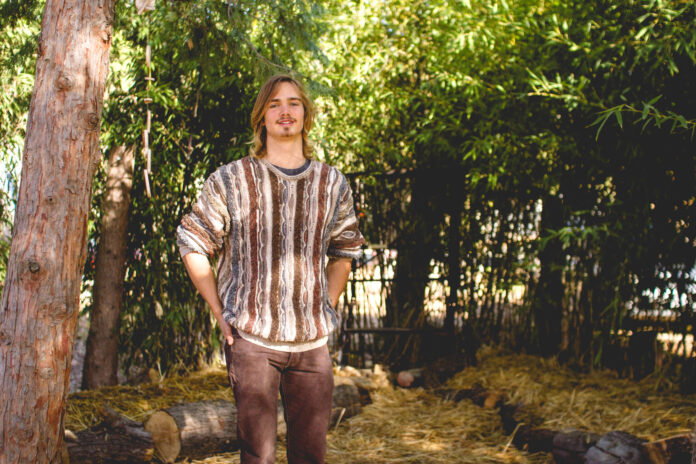Mushrooms will be blossoming at UC Davis this Winter Quarter through the efforts of community food projects at the Domes, the Student Farm and the popular course PLP 40: Mushroom Cultivation.
Jack Taylor, a third-year sustainable agriculture and food systems major, has been interested in mushrooms since he was 14 when he came across his first mushroom identification guide in his grandparents’ house. He is now initiating small scale cultivation on campus, bringing his enthusiasm and production experience to subsistence farming.
“I like learning about mushrooms because they would be a [sustainable] facet of a community-based food system,” Taylor said. “The Domes are a great community and a great place to experiment. [The mushroom project] is a community food source here. It’s not for profit or anything. At this point we’re just focusing on the ‘how.’”
Since August, Taylor has been interning with a small scale industrial mushroom farm in Sacramento called Dragon Gourmet Mushrooms. His internship has been sponsored by R. Michael Davis, UC Davis professor of plant pathology and facilitator of PLP 40.
Since then, Taylor has started growing his own mushrooms at home using waste materials from his internship, like the plastic bags of sawdust in which the mushrooms are cultivated. These waste materials still contain spawn which is the germinating transplant of fungi.
The spawn is then transferred or inoculated to straw which acts as the new substrate or growth medium and nutrient source for the mushrooms to colonize.
Taylor has made this the main model of the Domes’ mushroom project, along with some community members’ initiative to grow mushrooms on used coffee grounds.
However, these are not the first mushroom cultivation experiments that have been explored on campus.
For nearly 20 years the UC Davis Plant Pathology Department has offered PLP 40, devoted to the history and practice of mushroom cultivation. The hands-on, laboratory-intensive course was brought about by student demand. According to Davis, he has never had to advertise the course, and UC Davis is one of the few campuses in the country to offer it.
“One reason I teach the class is because I think everyone in California should appreciate agriculture, since it’s such an important industry in here,” Davis said. “I hope that a few students will be so interested that they might pursue it as a career, or for students to be able to teach other students how to grow mushrooms.”
According to Davis, mushrooms are the fifth most valued crop produced in the U.S., and can diversify any farm operation with minimal resources, since the growing medium for them is often straw or compost.
Due to the rarity of such university courses, Davis said students could have relative ease finding internships or jobs in mushroom operations, which has been the case for Taylor who first approached Dragon Gourmet Mushrooms at the Davis Farmers Market.
In PLP 40, students attend a one-hour lecture each week about the theory and history behind mushroom cultivation, and participate in a three-hour lab where they practice making their own tissue cultures from spores and utilizing growth chambers on campus to provide optimal temperature and humidity, which can often be a limiting factor when growing mushrooms at home.
The students grow oyster and shiitake mushrooms on straw, and button mushrooms on compost, which is provided by the professor.
Besides teaching PLP 40 to introduce students to mushrooms, Davis also harbors a personal passion for fungi.
“[Mushroom identification] takes you into the forest in the off season when it’s cooler and it’s rainy,” Davis said. “And the forest floor could be covered with different colors and shapes of mushrooms. It’s just an enjoyable pastime.”
Taylor also has a similar passion and hopes to share it with his fellow student body through his position as student lead farmer on the Student Farm. He is starting a mushroom project in the Ecological Garden on campus. The idea has come about through the establishment of farm dialogues this past year between farm staff, professors and students.
Erica Van Steenis, a community and regional development graduate student and volunteer and intern coordinator for the Student Farm, has teamed up with Taylor to make the project happen.
“Jack brought up the idea of cultivating mushrooms on logs during one of our farm dialogues, and we thought it could enrich the Ecological Garden through collaboration,” Van Steenis said.
The cultivation of logs entails drilling holes into the wood, placing spawn inside and covering it with wax. The success of this project and the Domes’ mushroom garden on straw depends on the environment and moisture levels of the substrate. However, both Van Steenis and Taylor are confident that the projects will have a positive impact on the communities.
“Interns are coming out to the Student Farm to learn and it’s great to teach them and learn from them, it’s a great community learning experience,” Taylor said. “Sustainable agriculture is a broad topic and I think it’s great that people are interested in alternative methods and knowing where their food comes from.”




